Legal and Ethical Issues in Online Security and Social Media
VerifiedAdded on 2020/07/23
|12
|3288
|43
Report
AI Summary
This report delves into the legal and ethical considerations surrounding online security, examining various aspects such as the use of honeypots, end-user license agreements (EULAs), legacy contracts, and the appropriate age for social networking platform usage. The report analyzes the ethical implications of deception in honeypot deployment, the ethical security aspects of EULAs in mobile applications, and the legal and ethical differences in digital legacies. It further explores the role of legacy contracts, using Facebook and Twitter as examples, and discusses the appropriate age for social media use. The report emphasizes the importance of adhering to legal and ethical principles to ensure responsible and secure online practices.

LEGAL ASPECTS
Paraphrase This Document
Need a fresh take? Get an instant paraphrase of this document with our AI Paraphraser
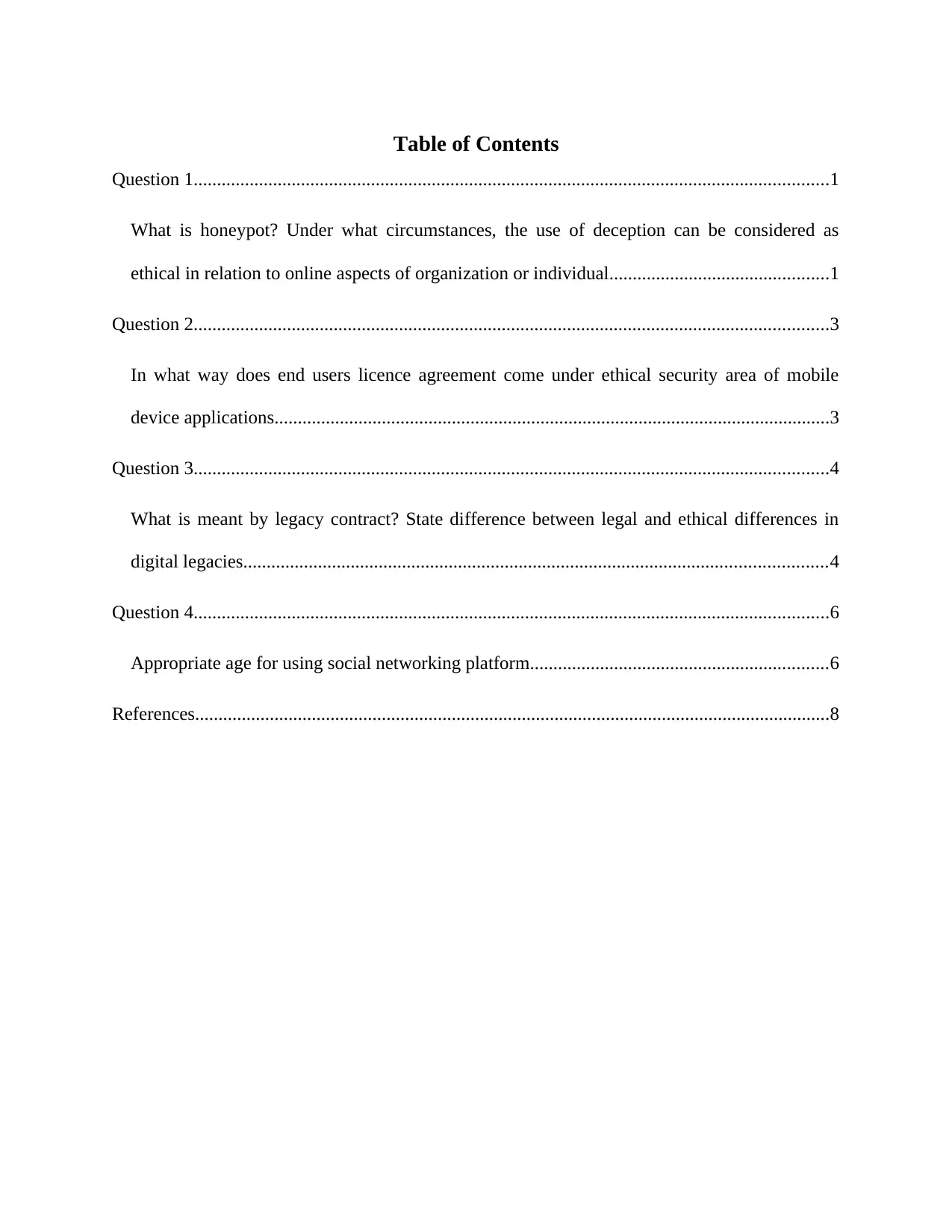
Table of Contents
Question 1........................................................................................................................................1
What is honeypot? Under what circumstances, the use of deception can be considered as
ethical in relation to online aspects of organization or individual...............................................1
Question 2........................................................................................................................................3
In what way does end users licence agreement come under ethical security area of mobile
device applications.......................................................................................................................3
Question 3........................................................................................................................................4
What is meant by legacy contract? State difference between legal and ethical differences in
digital legacies.............................................................................................................................4
Question 4........................................................................................................................................6
Appropriate age for using social networking platform................................................................6
References........................................................................................................................................8
Question 1........................................................................................................................................1
What is honeypot? Under what circumstances, the use of deception can be considered as
ethical in relation to online aspects of organization or individual...............................................1
Question 2........................................................................................................................................3
In what way does end users licence agreement come under ethical security area of mobile
device applications.......................................................................................................................3
Question 3........................................................................................................................................4
What is meant by legacy contract? State difference between legal and ethical differences in
digital legacies.............................................................................................................................4
Question 4........................................................................................................................................6
Appropriate age for using social networking platform................................................................6
References........................................................................................................................................8
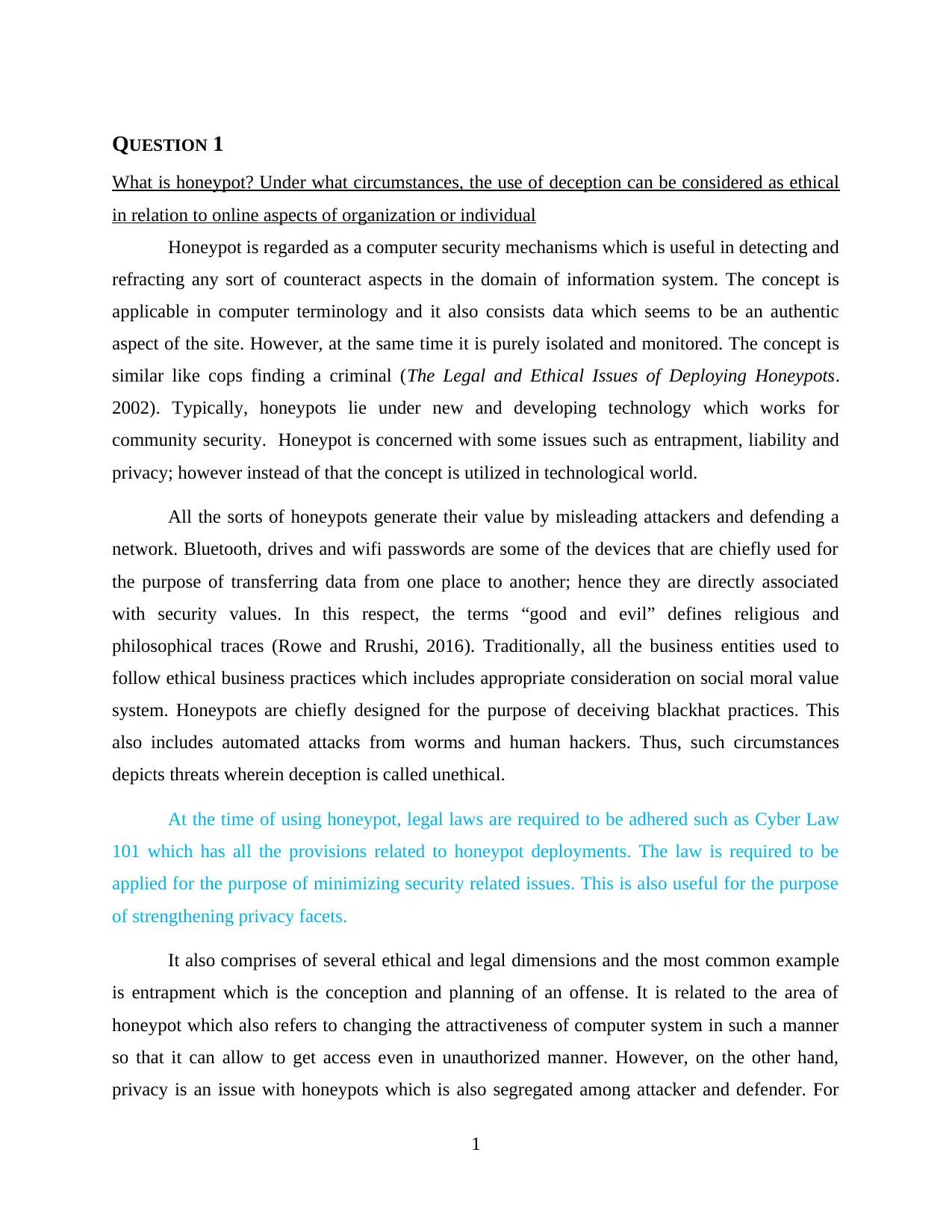
QUESTION 1
What is honeypot? Under what circumstances, the use of deception can be considered as ethical
in relation to online aspects of organization or individual
Honeypot is regarded as a computer security mechanisms which is useful in detecting and
refracting any sort of counteract aspects in the domain of information system. The concept is
applicable in computer terminology and it also consists data which seems to be an authentic
aspect of the site. However, at the same time it is purely isolated and monitored. The concept is
similar like cops finding a criminal (The Legal and Ethical Issues of Deploying Honeypots.
2002). Typically, honeypots lie under new and developing technology which works for
community security. Honeypot is concerned with some issues such as entrapment, liability and
privacy; however instead of that the concept is utilized in technological world.
All the sorts of honeypots generate their value by misleading attackers and defending a
network. Bluetooth, drives and wifi passwords are some of the devices that are chiefly used for
the purpose of transferring data from one place to another; hence they are directly associated
with security values. In this respect, the terms “good and evil” defines religious and
philosophical traces (Rowe and Rrushi, 2016). Traditionally, all the business entities used to
follow ethical business practices which includes appropriate consideration on social moral value
system. Honeypots are chiefly designed for the purpose of deceiving blackhat practices. This
also includes automated attacks from worms and human hackers. Thus, such circumstances
depicts threats wherein deception is called unethical.
At the time of using honeypot, legal laws are required to be adhered such as Cyber Law
101 which has all the provisions related to honeypot deployments. The law is required to be
applied for the purpose of minimizing security related issues. This is also useful for the purpose
of strengthening privacy facets.
It also comprises of several ethical and legal dimensions and the most common example
is entrapment which is the conception and planning of an offense. It is related to the area of
honeypot which also refers to changing the attractiveness of computer system in such a manner
so that it can allow to get access even in unauthorized manner. However, on the other hand,
privacy is an issue with honeypots which is also segregated among attacker and defender. For
1
What is honeypot? Under what circumstances, the use of deception can be considered as ethical
in relation to online aspects of organization or individual
Honeypot is regarded as a computer security mechanisms which is useful in detecting and
refracting any sort of counteract aspects in the domain of information system. The concept is
applicable in computer terminology and it also consists data which seems to be an authentic
aspect of the site. However, at the same time it is purely isolated and monitored. The concept is
similar like cops finding a criminal (The Legal and Ethical Issues of Deploying Honeypots.
2002). Typically, honeypots lie under new and developing technology which works for
community security. Honeypot is concerned with some issues such as entrapment, liability and
privacy; however instead of that the concept is utilized in technological world.
All the sorts of honeypots generate their value by misleading attackers and defending a
network. Bluetooth, drives and wifi passwords are some of the devices that are chiefly used for
the purpose of transferring data from one place to another; hence they are directly associated
with security values. In this respect, the terms “good and evil” defines religious and
philosophical traces (Rowe and Rrushi, 2016). Traditionally, all the business entities used to
follow ethical business practices which includes appropriate consideration on social moral value
system. Honeypots are chiefly designed for the purpose of deceiving blackhat practices. This
also includes automated attacks from worms and human hackers. Thus, such circumstances
depicts threats wherein deception is called unethical.
At the time of using honeypot, legal laws are required to be adhered such as Cyber Law
101 which has all the provisions related to honeypot deployments. The law is required to be
applied for the purpose of minimizing security related issues. This is also useful for the purpose
of strengthening privacy facets.
It also comprises of several ethical and legal dimensions and the most common example
is entrapment which is the conception and planning of an offense. It is related to the area of
honeypot which also refers to changing the attractiveness of computer system in such a manner
so that it can allow to get access even in unauthorized manner. However, on the other hand,
privacy is an issue with honeypots which is also segregated among attacker and defender. For
1
⊘ This is a preview!⊘
Do you want full access?
Subscribe today to unlock all pages.

Trusted by 1+ million students worldwide
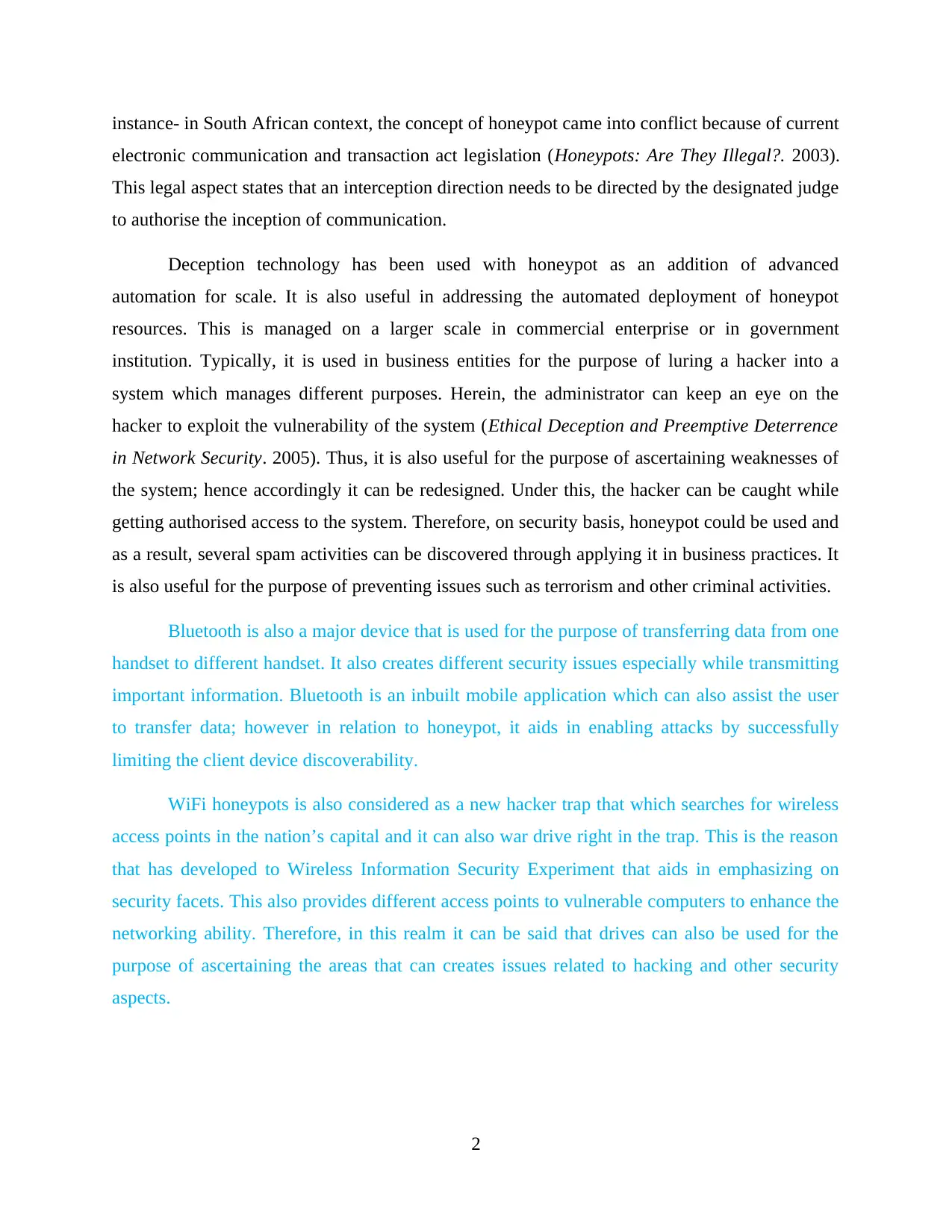
instance- in South African context, the concept of honeypot came into conflict because of current
electronic communication and transaction act legislation (Honeypots: Are They Illegal?. 2003).
This legal aspect states that an interception direction needs to be directed by the designated judge
to authorise the inception of communication.
Deception technology has been used with honeypot as an addition of advanced
automation for scale. It is also useful in addressing the automated deployment of honeypot
resources. This is managed on a larger scale in commercial enterprise or in government
institution. Typically, it is used in business entities for the purpose of luring a hacker into a
system which manages different purposes. Herein, the administrator can keep an eye on the
hacker to exploit the vulnerability of the system (Ethical Deception and Preemptive Deterrence
in Network Security. 2005). Thus, it is also useful for the purpose of ascertaining weaknesses of
the system; hence accordingly it can be redesigned. Under this, the hacker can be caught while
getting authorised access to the system. Therefore, on security basis, honeypot could be used and
as a result, several spam activities can be discovered through applying it in business practices. It
is also useful for the purpose of preventing issues such as terrorism and other criminal activities.
Bluetooth is also a major device that is used for the purpose of transferring data from one
handset to different handset. It also creates different security issues especially while transmitting
important information. Bluetooth is an inbuilt mobile application which can also assist the user
to transfer data; however in relation to honeypot, it aids in enabling attacks by successfully
limiting the client device discoverability.
WiFi honeypots is also considered as a new hacker trap that which searches for wireless
access points in the nation’s capital and it can also war drive right in the trap. This is the reason
that has developed to Wireless Information Security Experiment that aids in emphasizing on
security facets. This also provides different access points to vulnerable computers to enhance the
networking ability. Therefore, in this realm it can be said that drives can also be used for the
purpose of ascertaining the areas that can creates issues related to hacking and other security
aspects.
2
electronic communication and transaction act legislation (Honeypots: Are They Illegal?. 2003).
This legal aspect states that an interception direction needs to be directed by the designated judge
to authorise the inception of communication.
Deception technology has been used with honeypot as an addition of advanced
automation for scale. It is also useful in addressing the automated deployment of honeypot
resources. This is managed on a larger scale in commercial enterprise or in government
institution. Typically, it is used in business entities for the purpose of luring a hacker into a
system which manages different purposes. Herein, the administrator can keep an eye on the
hacker to exploit the vulnerability of the system (Ethical Deception and Preemptive Deterrence
in Network Security. 2005). Thus, it is also useful for the purpose of ascertaining weaknesses of
the system; hence accordingly it can be redesigned. Under this, the hacker can be caught while
getting authorised access to the system. Therefore, on security basis, honeypot could be used and
as a result, several spam activities can be discovered through applying it in business practices. It
is also useful for the purpose of preventing issues such as terrorism and other criminal activities.
Bluetooth is also a major device that is used for the purpose of transferring data from one
handset to different handset. It also creates different security issues especially while transmitting
important information. Bluetooth is an inbuilt mobile application which can also assist the user
to transfer data; however in relation to honeypot, it aids in enabling attacks by successfully
limiting the client device discoverability.
WiFi honeypots is also considered as a new hacker trap that which searches for wireless
access points in the nation’s capital and it can also war drive right in the trap. This is the reason
that has developed to Wireless Information Security Experiment that aids in emphasizing on
security facets. This also provides different access points to vulnerable computers to enhance the
networking ability. Therefore, in this realm it can be said that drives can also be used for the
purpose of ascertaining the areas that can creates issues related to hacking and other security
aspects.
2
Paraphrase This Document
Need a fresh take? Get an instant paraphrase of this document with our AI Paraphraser
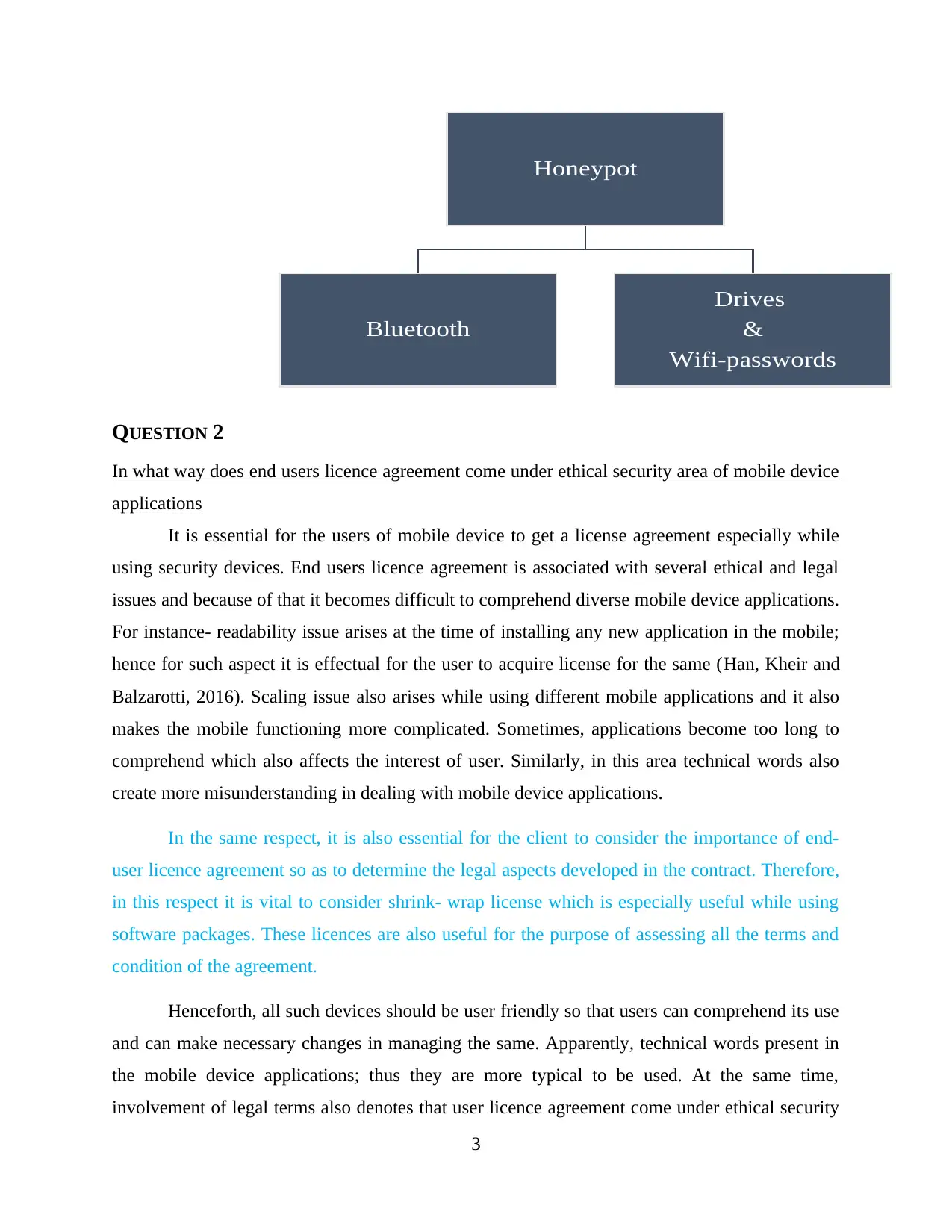
QUESTION 2
In what way does end users licence agreement come under ethical security area of mobile device
applications
It is essential for the users of mobile device to get a license agreement especially while
using security devices. End users licence agreement is associated with several ethical and legal
issues and because of that it becomes difficult to comprehend diverse mobile device applications.
For instance- readability issue arises at the time of installing any new application in the mobile;
hence for such aspect it is effectual for the user to acquire license for the same (Han, Kheir and
Balzarotti, 2016). Scaling issue also arises while using different mobile applications and it also
makes the mobile functioning more complicated. Sometimes, applications become too long to
comprehend which also affects the interest of user. Similarly, in this area technical words also
create more misunderstanding in dealing with mobile device applications.
In the same respect, it is also essential for the client to consider the importance of end-
user licence agreement so as to determine the legal aspects developed in the contract. Therefore,
in this respect it is vital to consider shrink- wrap license which is especially useful while using
software packages. These licences are also useful for the purpose of assessing all the terms and
condition of the agreement.
Henceforth, all such devices should be user friendly so that users can comprehend its use
and can make necessary changes in managing the same. Apparently, technical words present in
the mobile device applications; thus they are more typical to be used. At the same time,
involvement of legal terms also denotes that user licence agreement come under ethical security
3
Honeypot
Bluetooth
Drives
&
Wifi-passwords
In what way does end users licence agreement come under ethical security area of mobile device
applications
It is essential for the users of mobile device to get a license agreement especially while
using security devices. End users licence agreement is associated with several ethical and legal
issues and because of that it becomes difficult to comprehend diverse mobile device applications.
For instance- readability issue arises at the time of installing any new application in the mobile;
hence for such aspect it is effectual for the user to acquire license for the same (Han, Kheir and
Balzarotti, 2016). Scaling issue also arises while using different mobile applications and it also
makes the mobile functioning more complicated. Sometimes, applications become too long to
comprehend which also affects the interest of user. Similarly, in this area technical words also
create more misunderstanding in dealing with mobile device applications.
In the same respect, it is also essential for the client to consider the importance of end-
user licence agreement so as to determine the legal aspects developed in the contract. Therefore,
in this respect it is vital to consider shrink- wrap license which is especially useful while using
software packages. These licences are also useful for the purpose of assessing all the terms and
condition of the agreement.
Henceforth, all such devices should be user friendly so that users can comprehend its use
and can make necessary changes in managing the same. Apparently, technical words present in
the mobile device applications; thus they are more typical to be used. At the same time,
involvement of legal terms also denotes that user licence agreement come under ethical security
3
Honeypot
Bluetooth
Drives
&
Wifi-passwords
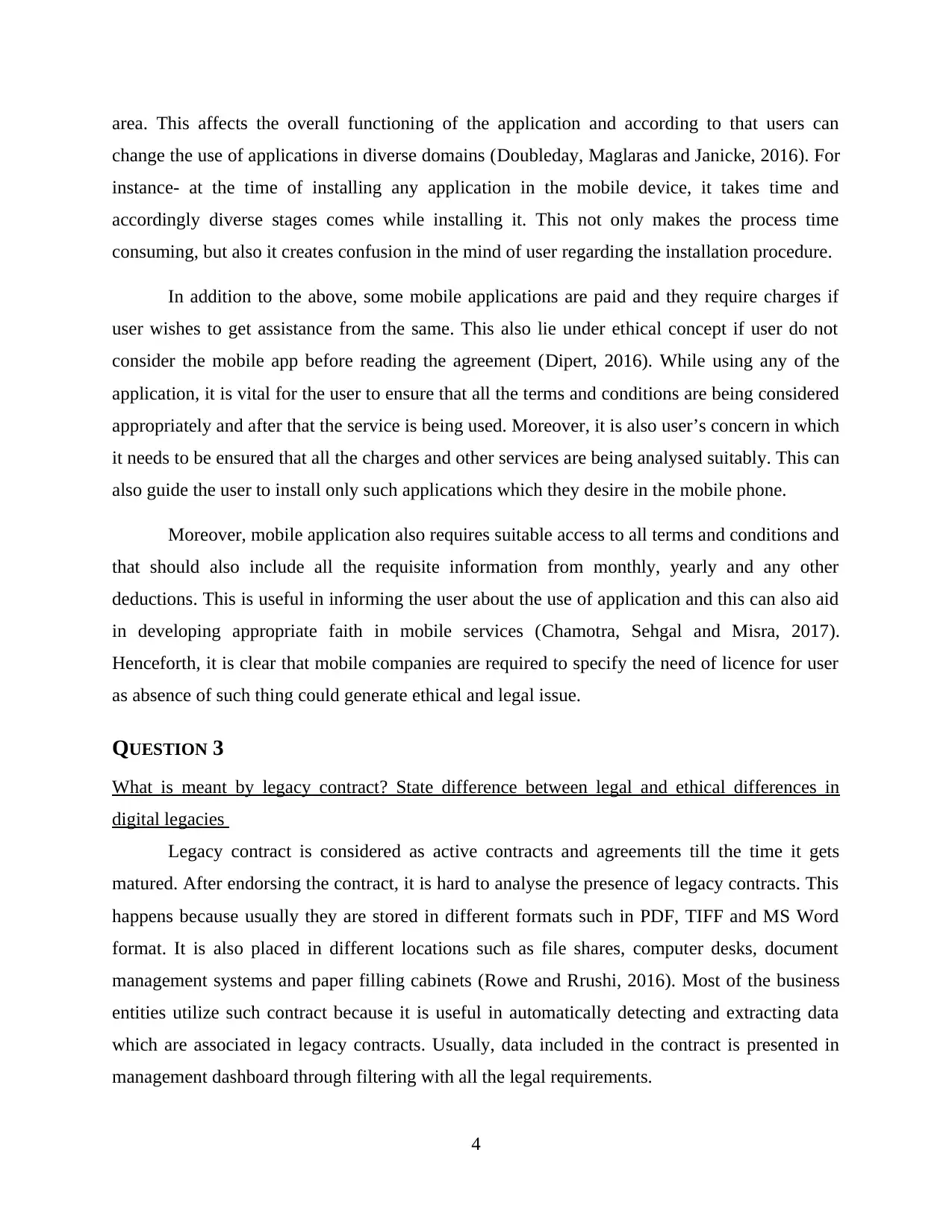
area. This affects the overall functioning of the application and according to that users can
change the use of applications in diverse domains (Doubleday, Maglaras and Janicke, 2016). For
instance- at the time of installing any application in the mobile device, it takes time and
accordingly diverse stages comes while installing it. This not only makes the process time
consuming, but also it creates confusion in the mind of user regarding the installation procedure.
In addition to the above, some mobile applications are paid and they require charges if
user wishes to get assistance from the same. This also lie under ethical concept if user do not
consider the mobile app before reading the agreement (Dipert, 2016). While using any of the
application, it is vital for the user to ensure that all the terms and conditions are being considered
appropriately and after that the service is being used. Moreover, it is also user’s concern in which
it needs to be ensured that all the charges and other services are being analysed suitably. This can
also guide the user to install only such applications which they desire in the mobile phone.
Moreover, mobile application also requires suitable access to all terms and conditions and
that should also include all the requisite information from monthly, yearly and any other
deductions. This is useful in informing the user about the use of application and this can also aid
in developing appropriate faith in mobile services (Chamotra, Sehgal and Misra, 2017).
Henceforth, it is clear that mobile companies are required to specify the need of licence for user
as absence of such thing could generate ethical and legal issue.
QUESTION 3
What is meant by legacy contract? State difference between legal and ethical differences in
digital legacies
Legacy contract is considered as active contracts and agreements till the time it gets
matured. After endorsing the contract, it is hard to analyse the presence of legacy contracts. This
happens because usually they are stored in different formats such in PDF, TIFF and MS Word
format. It is also placed in different locations such as file shares, computer desks, document
management systems and paper filling cabinets (Rowe and Rrushi, 2016). Most of the business
entities utilize such contract because it is useful in automatically detecting and extracting data
which are associated in legacy contracts. Usually, data included in the contract is presented in
management dashboard through filtering with all the legal requirements.
4
change the use of applications in diverse domains (Doubleday, Maglaras and Janicke, 2016). For
instance- at the time of installing any application in the mobile device, it takes time and
accordingly diverse stages comes while installing it. This not only makes the process time
consuming, but also it creates confusion in the mind of user regarding the installation procedure.
In addition to the above, some mobile applications are paid and they require charges if
user wishes to get assistance from the same. This also lie under ethical concept if user do not
consider the mobile app before reading the agreement (Dipert, 2016). While using any of the
application, it is vital for the user to ensure that all the terms and conditions are being considered
appropriately and after that the service is being used. Moreover, it is also user’s concern in which
it needs to be ensured that all the charges and other services are being analysed suitably. This can
also guide the user to install only such applications which they desire in the mobile phone.
Moreover, mobile application also requires suitable access to all terms and conditions and
that should also include all the requisite information from monthly, yearly and any other
deductions. This is useful in informing the user about the use of application and this can also aid
in developing appropriate faith in mobile services (Chamotra, Sehgal and Misra, 2017).
Henceforth, it is clear that mobile companies are required to specify the need of licence for user
as absence of such thing could generate ethical and legal issue.
QUESTION 3
What is meant by legacy contract? State difference between legal and ethical differences in
digital legacies
Legacy contract is considered as active contracts and agreements till the time it gets
matured. After endorsing the contract, it is hard to analyse the presence of legacy contracts. This
happens because usually they are stored in different formats such in PDF, TIFF and MS Word
format. It is also placed in different locations such as file shares, computer desks, document
management systems and paper filling cabinets (Rowe and Rrushi, 2016). Most of the business
entities utilize such contract because it is useful in automatically detecting and extracting data
which are associated in legacy contracts. Usually, data included in the contract is presented in
management dashboard through filtering with all the legal requirements.
4
⊘ This is a preview!⊘
Do you want full access?
Subscribe today to unlock all pages.

Trusted by 1+ million students worldwide
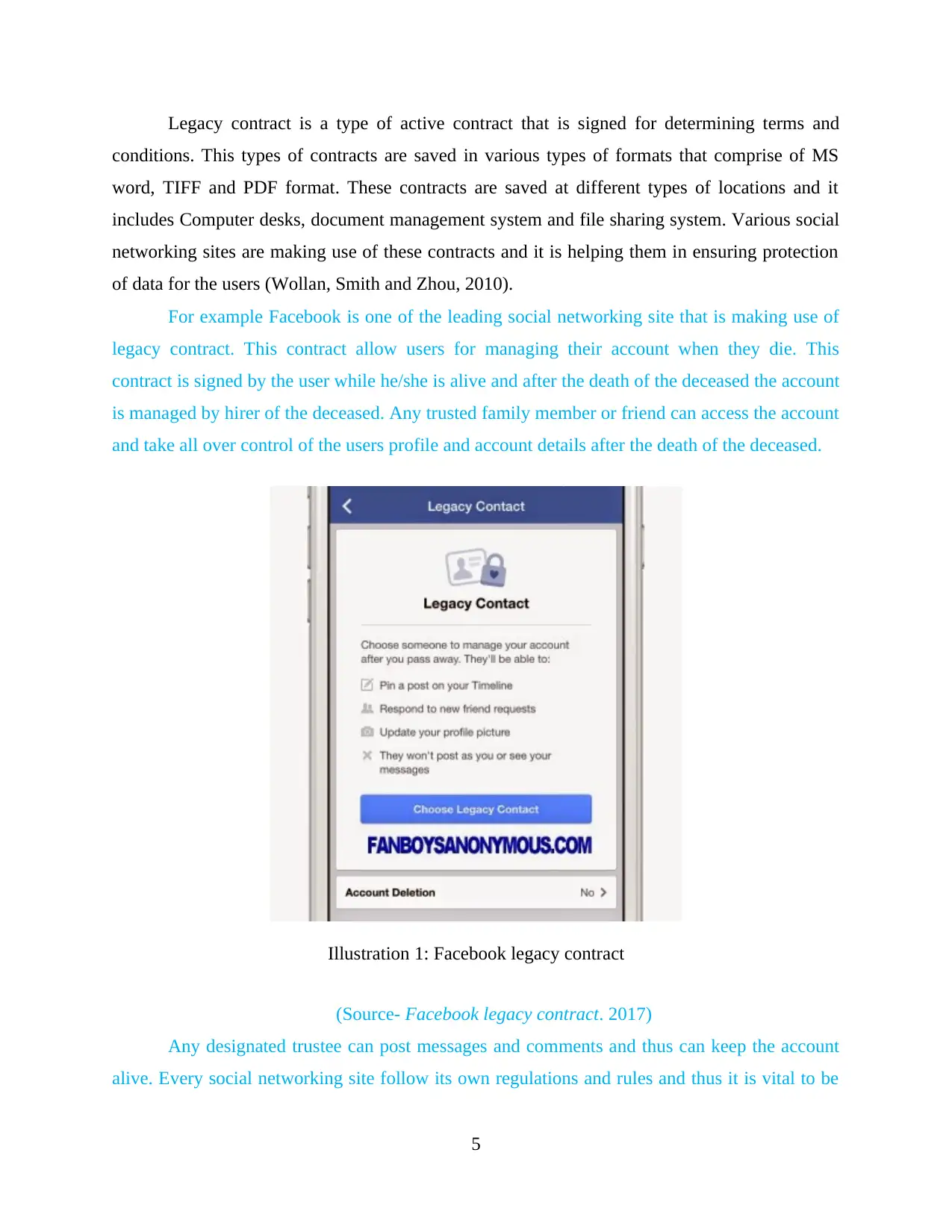
Legacy contract is a type of active contract that is signed for determining terms and
conditions. This types of contracts are saved in various types of formats that comprise of MS
word, TIFF and PDF format. These contracts are saved at different types of locations and it
includes Computer desks, document management system and file sharing system. Various social
networking sites are making use of these contracts and it is helping them in ensuring protection
of data for the users (Wollan, Smith and Zhou, 2010).
For example Facebook is one of the leading social networking site that is making use of
legacy contract. This contract allow users for managing their account when they die. This
contract is signed by the user while he/she is alive and after the death of the deceased the account
is managed by hirer of the deceased. Any trusted family member or friend can access the account
and take all over control of the users profile and account details after the death of the deceased.
(Source- Facebook legacy contract. 2017)
Any designated trustee can post messages and comments and thus can keep the account
alive. Every social networking site follow its own regulations and rules and thus it is vital to be
5
Illustration 1: Facebook legacy contract
conditions. This types of contracts are saved in various types of formats that comprise of MS
word, TIFF and PDF format. These contracts are saved at different types of locations and it
includes Computer desks, document management system and file sharing system. Various social
networking sites are making use of these contracts and it is helping them in ensuring protection
of data for the users (Wollan, Smith and Zhou, 2010).
For example Facebook is one of the leading social networking site that is making use of
legacy contract. This contract allow users for managing their account when they die. This
contract is signed by the user while he/she is alive and after the death of the deceased the account
is managed by hirer of the deceased. Any trusted family member or friend can access the account
and take all over control of the users profile and account details after the death of the deceased.
(Source- Facebook legacy contract. 2017)
Any designated trustee can post messages and comments and thus can keep the account
alive. Every social networking site follow its own regulations and rules and thus it is vital to be
5
Illustration 1: Facebook legacy contract
Paraphrase This Document
Need a fresh take? Get an instant paraphrase of this document with our AI Paraphraser
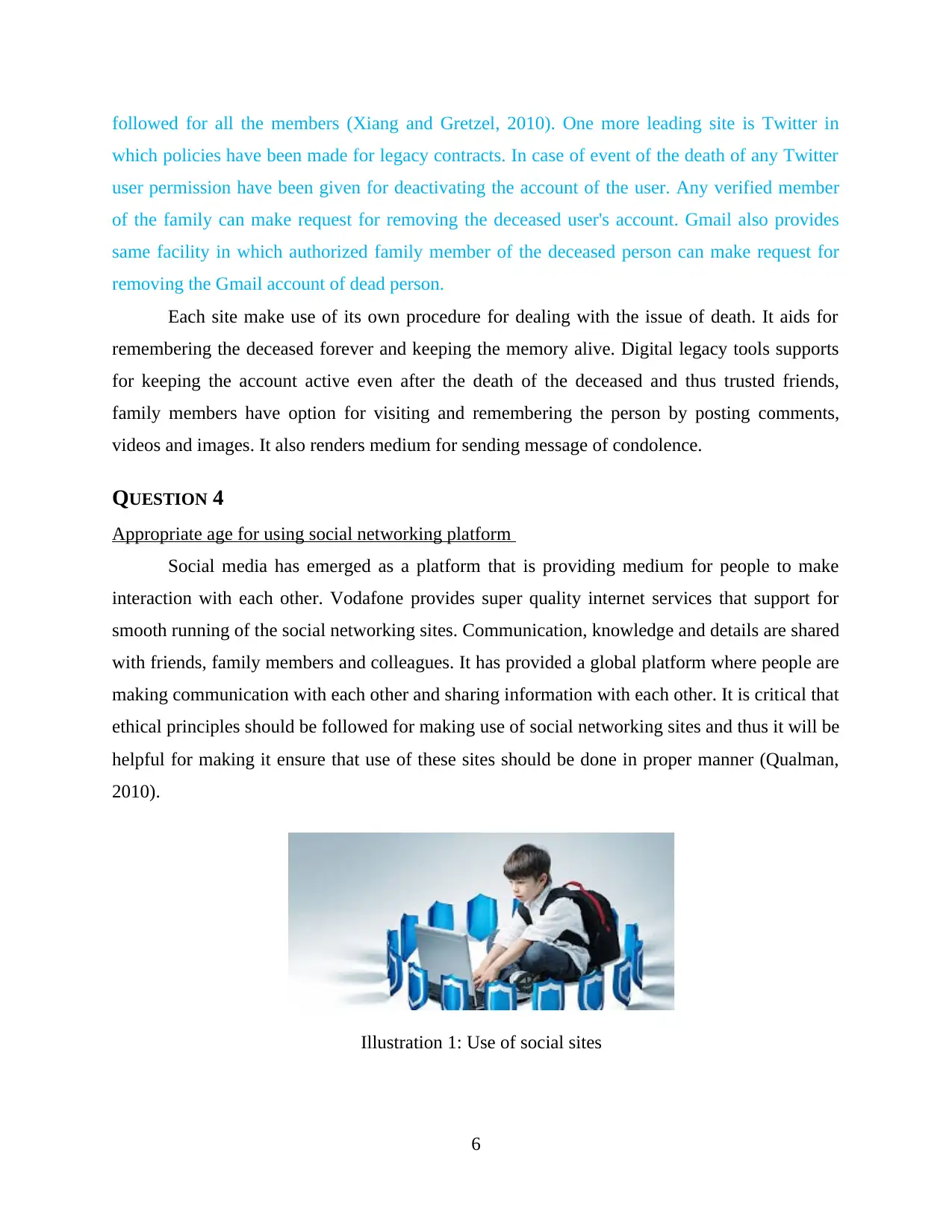
followed for all the members (Xiang and Gretzel, 2010). One more leading site is Twitter in
which policies have been made for legacy contracts. In case of event of the death of any Twitter
user permission have been given for deactivating the account of the user. Any verified member
of the family can make request for removing the deceased user's account. Gmail also provides
same facility in which authorized family member of the deceased person can make request for
removing the Gmail account of dead person.
Each site make use of its own procedure for dealing with the issue of death. It aids for
remembering the deceased forever and keeping the memory alive. Digital legacy tools supports
for keeping the account active even after the death of the deceased and thus trusted friends,
family members have option for visiting and remembering the person by posting comments,
videos and images. It also renders medium for sending message of condolence.
QUESTION 4
Appropriate age for using social networking platform
Social media has emerged as a platform that is providing medium for people to make
interaction with each other. Vodafone provides super quality internet services that support for
smooth running of the social networking sites. Communication, knowledge and details are shared
with friends, family members and colleagues. It has provided a global platform where people are
making communication with each other and sharing information with each other. It is critical that
ethical principles should be followed for making use of social networking sites and thus it will be
helpful for making it ensure that use of these sites should be done in proper manner (Qualman,
2010).
6
Illustration 1: Use of social sites
which policies have been made for legacy contracts. In case of event of the death of any Twitter
user permission have been given for deactivating the account of the user. Any verified member
of the family can make request for removing the deceased user's account. Gmail also provides
same facility in which authorized family member of the deceased person can make request for
removing the Gmail account of dead person.
Each site make use of its own procedure for dealing with the issue of death. It aids for
remembering the deceased forever and keeping the memory alive. Digital legacy tools supports
for keeping the account active even after the death of the deceased and thus trusted friends,
family members have option for visiting and remembering the person by posting comments,
videos and images. It also renders medium for sending message of condolence.
QUESTION 4
Appropriate age for using social networking platform
Social media has emerged as a platform that is providing medium for people to make
interaction with each other. Vodafone provides super quality internet services that support for
smooth running of the social networking sites. Communication, knowledge and details are shared
with friends, family members and colleagues. It has provided a global platform where people are
making communication with each other and sharing information with each other. It is critical that
ethical principles should be followed for making use of social networking sites and thus it will be
helpful for making it ensure that use of these sites should be done in proper manner (Qualman,
2010).
6
Illustration 1: Use of social sites
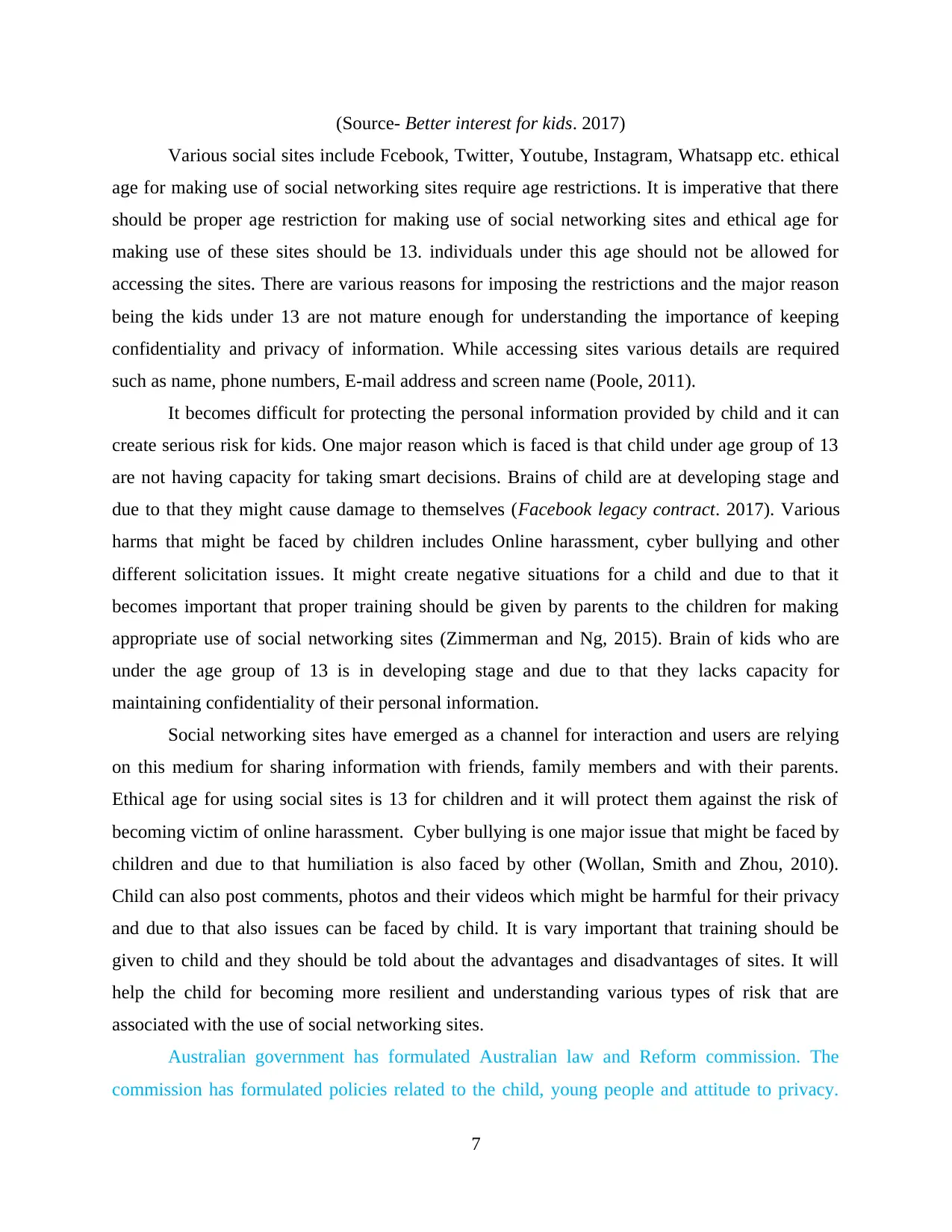
(Source- Better interest for kids. 2017)
Various social sites include Fcebook, Twitter, Youtube, Instagram, Whatsapp etc. ethical
age for making use of social networking sites require age restrictions. It is imperative that there
should be proper age restriction for making use of social networking sites and ethical age for
making use of these sites should be 13. individuals under this age should not be allowed for
accessing the sites. There are various reasons for imposing the restrictions and the major reason
being the kids under 13 are not mature enough for understanding the importance of keeping
confidentiality and privacy of information. While accessing sites various details are required
such as name, phone numbers, E-mail address and screen name (Poole, 2011).
It becomes difficult for protecting the personal information provided by child and it can
create serious risk for kids. One major reason which is faced is that child under age group of 13
are not having capacity for taking smart decisions. Brains of child are at developing stage and
due to that they might cause damage to themselves (Facebook legacy contract. 2017). Various
harms that might be faced by children includes Online harassment, cyber bullying and other
different solicitation issues. It might create negative situations for a child and due to that it
becomes important that proper training should be given by parents to the children for making
appropriate use of social networking sites (Zimmerman and Ng, 2015). Brain of kids who are
under the age group of 13 is in developing stage and due to that they lacks capacity for
maintaining confidentiality of their personal information.
Social networking sites have emerged as a channel for interaction and users are relying
on this medium for sharing information with friends, family members and with their parents.
Ethical age for using social sites is 13 for children and it will protect them against the risk of
becoming victim of online harassment. Cyber bullying is one major issue that might be faced by
children and due to that humiliation is also faced by other (Wollan, Smith and Zhou, 2010).
Child can also post comments, photos and their videos which might be harmful for their privacy
and due to that also issues can be faced by child. It is vary important that training should be
given to child and they should be told about the advantages and disadvantages of sites. It will
help the child for becoming more resilient and understanding various types of risk that are
associated with the use of social networking sites.
Australian government has formulated Australian law and Reform commission. The
commission has formulated policies related to the child, young people and attitude to privacy.
7
Various social sites include Fcebook, Twitter, Youtube, Instagram, Whatsapp etc. ethical
age for making use of social networking sites require age restrictions. It is imperative that there
should be proper age restriction for making use of social networking sites and ethical age for
making use of these sites should be 13. individuals under this age should not be allowed for
accessing the sites. There are various reasons for imposing the restrictions and the major reason
being the kids under 13 are not mature enough for understanding the importance of keeping
confidentiality and privacy of information. While accessing sites various details are required
such as name, phone numbers, E-mail address and screen name (Poole, 2011).
It becomes difficult for protecting the personal information provided by child and it can
create serious risk for kids. One major reason which is faced is that child under age group of 13
are not having capacity for taking smart decisions. Brains of child are at developing stage and
due to that they might cause damage to themselves (Facebook legacy contract. 2017). Various
harms that might be faced by children includes Online harassment, cyber bullying and other
different solicitation issues. It might create negative situations for a child and due to that it
becomes important that proper training should be given by parents to the children for making
appropriate use of social networking sites (Zimmerman and Ng, 2015). Brain of kids who are
under the age group of 13 is in developing stage and due to that they lacks capacity for
maintaining confidentiality of their personal information.
Social networking sites have emerged as a channel for interaction and users are relying
on this medium for sharing information with friends, family members and with their parents.
Ethical age for using social sites is 13 for children and it will protect them against the risk of
becoming victim of online harassment. Cyber bullying is one major issue that might be faced by
children and due to that humiliation is also faced by other (Wollan, Smith and Zhou, 2010).
Child can also post comments, photos and their videos which might be harmful for their privacy
and due to that also issues can be faced by child. It is vary important that training should be
given to child and they should be told about the advantages and disadvantages of sites. It will
help the child for becoming more resilient and understanding various types of risk that are
associated with the use of social networking sites.
Australian government has formulated Australian law and Reform commission. The
commission has formulated policies related to the child, young people and attitude to privacy.
7
⊘ This is a preview!⊘
Do you want full access?
Subscribe today to unlock all pages.

Trusted by 1+ million students worldwide
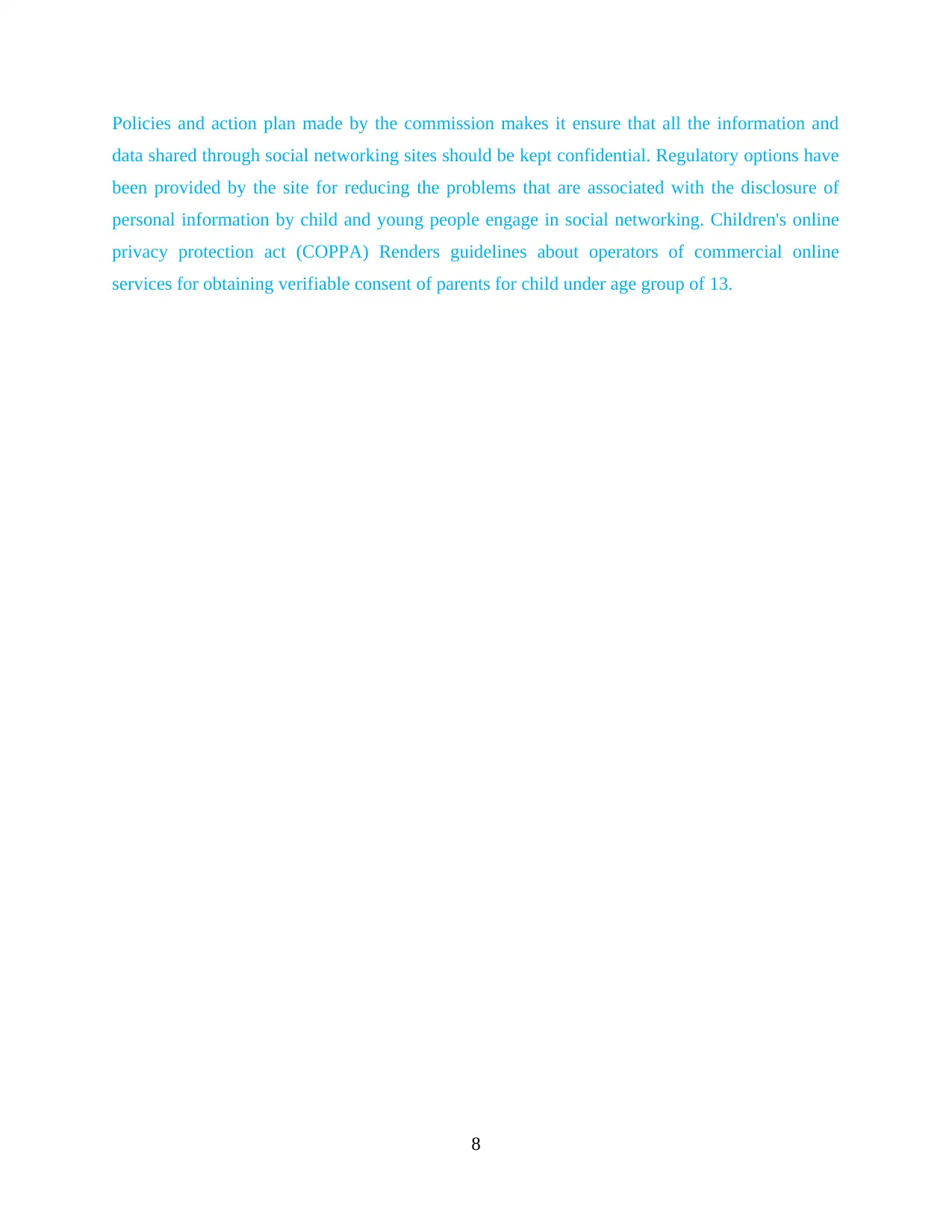
Policies and action plan made by the commission makes it ensure that all the information and
data shared through social networking sites should be kept confidential. Regulatory options have
been provided by the site for reducing the problems that are associated with the disclosure of
personal information by child and young people engage in social networking. Children's online
privacy protection act (COPPA) Renders guidelines about operators of commercial online
services for obtaining verifiable consent of parents for child under age group of 13.
8
data shared through social networking sites should be kept confidential. Regulatory options have
been provided by the site for reducing the problems that are associated with the disclosure of
personal information by child and young people engage in social networking. Children's online
privacy protection act (COPPA) Renders guidelines about operators of commercial online
services for obtaining verifiable consent of parents for child under age group of 13.
8
Paraphrase This Document
Need a fresh take? Get an instant paraphrase of this document with our AI Paraphraser
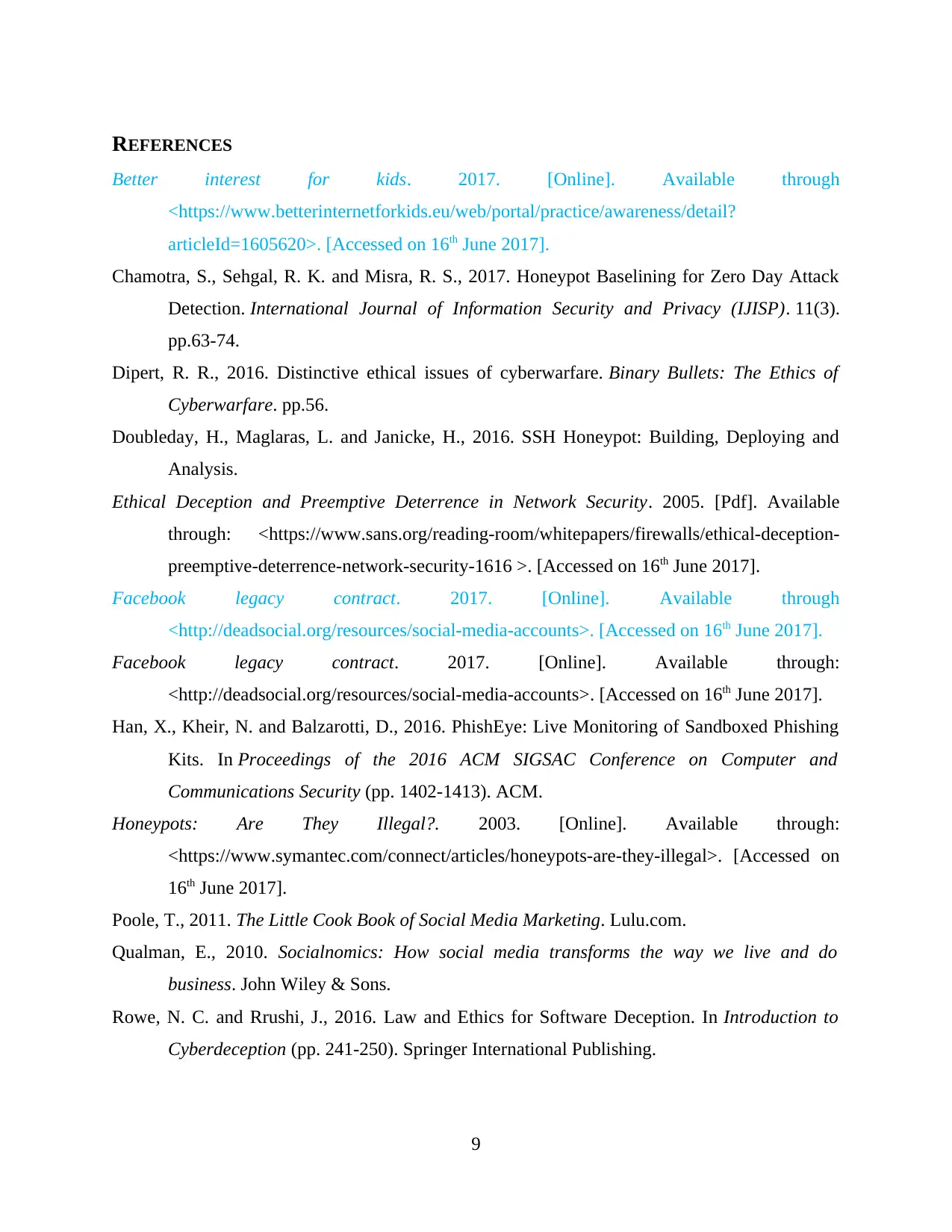
REFERENCES
Better interest for kids. 2017. [Online]. Available through
<https://www.betterinternetforkids.eu/web/portal/practice/awareness/detail?
articleId=1605620>. [Accessed on 16th June 2017].
Chamotra, S., Sehgal, R. K. and Misra, R. S., 2017. Honeypot Baselining for Zero Day Attack
Detection. International Journal of Information Security and Privacy (IJISP). 11(3).
pp.63-74.
Dipert, R. R., 2016. Distinctive ethical issues of cyberwarfare. Binary Bullets: The Ethics of
Cyberwarfare. pp.56.
Doubleday, H., Maglaras, L. and Janicke, H., 2016. SSH Honeypot: Building, Deploying and
Analysis.
Ethical Deception and Preemptive Deterrence in Network Security. 2005. [Pdf]. Available
through: <https://www.sans.org/reading-room/whitepapers/firewalls/ethical-deception-
preemptive-deterrence-network-security-1616 >. [Accessed on 16th June 2017].
Facebook legacy contract. 2017. [Online]. Available through
<http://deadsocial.org/resources/social-media-accounts>. [Accessed on 16th June 2017].
Facebook legacy contract. 2017. [Online]. Available through:
<http://deadsocial.org/resources/social-media-accounts>. [Accessed on 16th June 2017].
Han, X., Kheir, N. and Balzarotti, D., 2016. PhishEye: Live Monitoring of Sandboxed Phishing
Kits. In Proceedings of the 2016 ACM SIGSAC Conference on Computer and
Communications Security (pp. 1402-1413). ACM.
Honeypots: Are They Illegal?. 2003. [Online]. Available through:
<https://www.symantec.com/connect/articles/honeypots-are-they-illegal>. [Accessed on
16th June 2017].
Poole, T., 2011. The Little Cook Book of Social Media Marketing. Lulu.com.
Qualman, E., 2010. Socialnomics: How social media transforms the way we live and do
business. John Wiley & Sons.
Rowe, N. C. and Rrushi, J., 2016. Law and Ethics for Software Deception. In Introduction to
Cyberdeception (pp. 241-250). Springer International Publishing.
9
Better interest for kids. 2017. [Online]. Available through
<https://www.betterinternetforkids.eu/web/portal/practice/awareness/detail?
articleId=1605620>. [Accessed on 16th June 2017].
Chamotra, S., Sehgal, R. K. and Misra, R. S., 2017. Honeypot Baselining for Zero Day Attack
Detection. International Journal of Information Security and Privacy (IJISP). 11(3).
pp.63-74.
Dipert, R. R., 2016. Distinctive ethical issues of cyberwarfare. Binary Bullets: The Ethics of
Cyberwarfare. pp.56.
Doubleday, H., Maglaras, L. and Janicke, H., 2016. SSH Honeypot: Building, Deploying and
Analysis.
Ethical Deception and Preemptive Deterrence in Network Security. 2005. [Pdf]. Available
through: <https://www.sans.org/reading-room/whitepapers/firewalls/ethical-deception-
preemptive-deterrence-network-security-1616 >. [Accessed on 16th June 2017].
Facebook legacy contract. 2017. [Online]. Available through
<http://deadsocial.org/resources/social-media-accounts>. [Accessed on 16th June 2017].
Facebook legacy contract. 2017. [Online]. Available through:
<http://deadsocial.org/resources/social-media-accounts>. [Accessed on 16th June 2017].
Han, X., Kheir, N. and Balzarotti, D., 2016. PhishEye: Live Monitoring of Sandboxed Phishing
Kits. In Proceedings of the 2016 ACM SIGSAC Conference on Computer and
Communications Security (pp. 1402-1413). ACM.
Honeypots: Are They Illegal?. 2003. [Online]. Available through:
<https://www.symantec.com/connect/articles/honeypots-are-they-illegal>. [Accessed on
16th June 2017].
Poole, T., 2011. The Little Cook Book of Social Media Marketing. Lulu.com.
Qualman, E., 2010. Socialnomics: How social media transforms the way we live and do
business. John Wiley & Sons.
Rowe, N. C. and Rrushi, J., 2016. Law and Ethics for Software Deception. In Introduction to
Cyberdeception (pp. 241-250). Springer International Publishing.
9
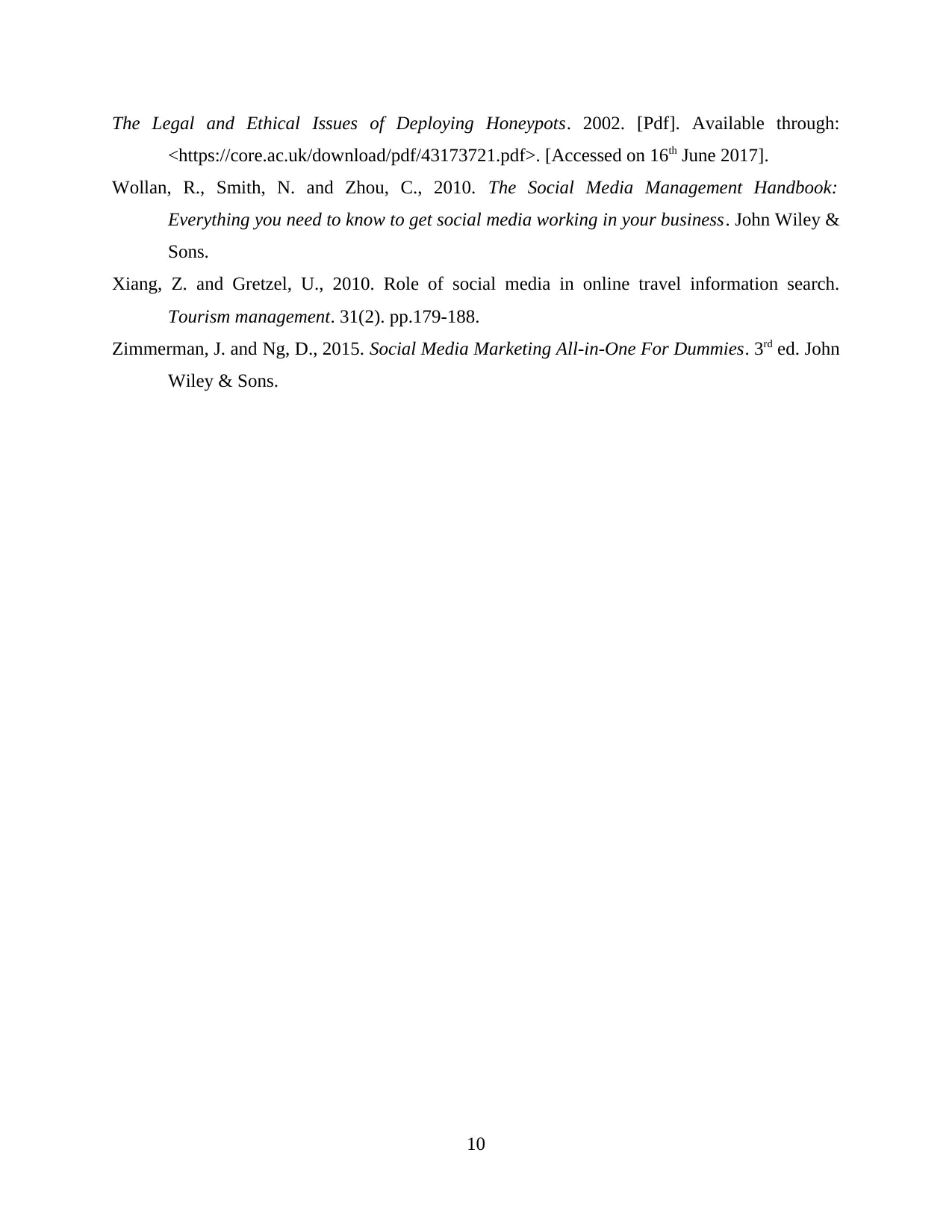
The Legal and Ethical Issues of Deploying Honeypots. 2002. [Pdf]. Available through:
<https://core.ac.uk/download/pdf/43173721.pdf>. [Accessed on 16th June 2017].
Wollan, R., Smith, N. and Zhou, C., 2010. The Social Media Management Handbook:
Everything you need to know to get social media working in your business. John Wiley &
Sons.
Xiang, Z. and Gretzel, U., 2010. Role of social media in online travel information search.
Tourism management. 31(2). pp.179-188.
Zimmerman, J. and Ng, D., 2015. Social Media Marketing All-in-One For Dummies. 3rd ed. John
Wiley & Sons.
10
<https://core.ac.uk/download/pdf/43173721.pdf>. [Accessed on 16th June 2017].
Wollan, R., Smith, N. and Zhou, C., 2010. The Social Media Management Handbook:
Everything you need to know to get social media working in your business. John Wiley &
Sons.
Xiang, Z. and Gretzel, U., 2010. Role of social media in online travel information search.
Tourism management. 31(2). pp.179-188.
Zimmerman, J. and Ng, D., 2015. Social Media Marketing All-in-One For Dummies. 3rd ed. John
Wiley & Sons.
10
⊘ This is a preview!⊘
Do you want full access?
Subscribe today to unlock all pages.

Trusted by 1+ million students worldwide
1 out of 12
Related Documents
Your All-in-One AI-Powered Toolkit for Academic Success.
+13062052269
info@desklib.com
Available 24*7 on WhatsApp / Email
![[object Object]](/_next/static/media/star-bottom.7253800d.svg)
Unlock your academic potential
Copyright © 2020–2026 A2Z Services. All Rights Reserved. Developed and managed by ZUCOL.





